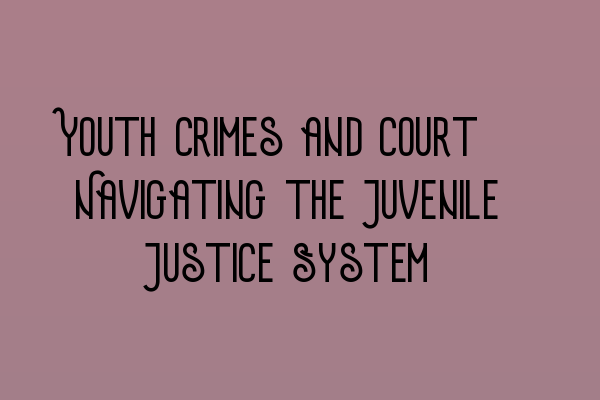Youth Crimes and Court: Navigating the Juvenile Justice System
When it comes to youth crimes, it is crucial to understand the processes and intricacies of the juvenile justice system. Juvenile offenders require a different approach compared to adult offenders, considering their age, level of maturity, and the potential for rehabilitation. At SQE Criminal Law & Practice Law UK, we aim to guide you through this challenging journey with our expertise in criminal law and experience in handling juvenile cases.
Understanding the Juvenile Justice System
The juvenile justice system is designed to handle cases involving individuals under the age of 18 who have been accused of committing crimes. It operates on the principle of rehabilitation rather than punishment, recognizing that young individuals can be rehabilitated and reintegrated into society.
One important aspect of the juvenile justice system is confidentiality. Unlike adult criminal court proceedings, juvenile court cases are generally closed to the public. This is done to protect the privacy and future prospects of the young offenders, allowing them a chance to learn from their mistakes without a permanent stigma.
Steps in the Juvenile Court Process
The juvenile court process consists of several stages, each with its own purpose and requirements. Understanding these steps can help juveniles and their families navigate the system effectively. Here are the key stages:
- Arrest: When a minor is suspected of committing a crime, they may be taken into custody by the police.
- Detention Hearing: The court determines whether the minor should be released or detained pending a formal hearing.
- Adjudication Hearing: This is the equivalent of a trial in juvenile court. The judge reviews the evidence presented and determines whether the minor is responsible for the alleged offense.
- Disposition Hearing: If the minor is found responsible, the court decides the appropriate disposition. This can include counseling, probation, community service, or placement in a residential facility.
- Post-Disposition: After the disposition, the court may require the minor to comply with certain conditions, such as attending school, participating in rehabilitation programs, or staying away from certain individuals.
- Expungement: Under certain circumstances, a juvenile’s record can be expunged to provide a fresh start once they reach adulthood.
Importance of Legal Representation
Obtaining legal representation is crucial for juveniles facing criminal charges. Our experienced team at SQE Criminal Law & Practice Law UK can provide the guidance and support necessary to ensure that juveniles’ rights are protected throughout the legal process. We understand the unique aspects of juvenile law and are committed to advocating for the best possible outcome for our clients.
Our workshops and seminars on criminal practice offer a comprehensive understanding of the juvenile justice system. These interactive learning sessions help legal professionals enhance their expertise in handling youth crimes and navigate the complexities of the court process. To expand your knowledge and skills in the field of criminal practice, check out our Workshops and Seminars on Criminal Practice: Expanding Your Expertise.
Staying Informed and Prepared
Remaining updated with the ever-changing UK criminal laws is essential for legal professionals dealing with youth crimes. By staying informed, you can effectively represent your clients and ensure compliance with the latest legal requirements. Our article on Updates in UK Criminal Laws: Staying Informed and Prepared provides valuable insights into the latest developments in criminal law and explains how you can stay ahead of the curve.
Preparing for SQE Criminal Practice Exam
Mock tests play a crucial role in preparing for the SQE Criminal Practice Exam. Through simulated exam scenarios, you can familiarize yourself with the format, time constraints, and types of questions you may encounter during the actual exam. Our article on Mock Tests for SQE Criminal Practice: Exam Simulation for Success provides detailed information on how these tests can help you assess and improve your knowledge and skills, increasing your chances of success.
Enhancing Study Group Experience
Joining a study group can greatly enhance your SQE Criminal Law preparation. Collaborating with fellow students, sharing insights, and discussing complex topics can deepen your understanding and provide fresh perspectives. Our article on Enhancing Your SQE Criminal Law Study Group Experience offers valuable tips and strategies to make the most out of your study group sessions, ensuring effective learning and efficient exam preparation.
Understanding Criminal Evidence Rules
Decoding criminal evidence rules is essential for building a strong case in juvenile court. Understanding the admissibility of evidence, the burden of proof, and the rights of the accused are key elements in securing a fair trial. Our article on Decoding Criminal Evidence Rules: A Detailed Analysis provides a comprehensive analysis of these rules, helping legal professionals navigate the complexities of presenting and challenging evidence in court.
At SQE Criminal Law & Practice Law UK, we are dedicated to assisting you in navigating the juvenile justice system. Our team of experienced solicitors is well-versed in handling youth crimes and will work tirelessly to protect the rights and interests of young offenders. Contact us today to learn more about our services and how we can assist you in your legal journey.
